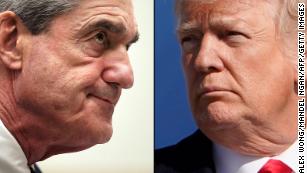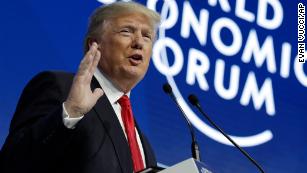2018.01.26; Sorry, Mr. President, the 'fake news' excuse isn't good enough anymore - CNNPolitics
Published by DB,
Washington (CNN) — In Davos, Switzerland, on Friday, President Donald Trump was asked about reporting by a slew of media organizations -- including CNN -- that he had ordered White House counsel Don McGahn to fire special counsel Bob Mueller.
"Fake news," Trump replied. "Fake news. Typical New York Times fake stories."
And that was it. Which is not good enough. Not even close to good enough.
The reporting that Trump had ordered Mueller's firing is a) deeply sourced b) confirmed -- after being first broken by The New York Times -- by a number of serious and credible media outlets and c) very detailed as to how and why Trump moved to fire Mueller.
Given both the seriousness of those charges and the depth of the reporting, it is a massive -- and, likely, purposeful -- cop-out by Trump to simply reply with his standard issue "fake news."
What about it is fake? Did he not tell McGahn to get rid of Mueller?
Because, if he didn't, then Trump should come out and say "I absolutely did not -- at any time or ever -- ask Don McGahn to remove Bob Mueller from the special counsel investigation."
He didn't say that. And White House lawyer Ty Cobb didn't either, refusing to comment on the reports of the Mueller firing out of "respect for the Office of the Special Counsel and its process."
Which means, almost certainly, that it did happen.
So, why then is Trump describing it as "fake news"?
Two thoughts:
- There is some minor detail in the story that is incorrect or described slightly differently than it actually happened. Because Trump knows there is something -- albeit not the thrust of the reporting -- that is wrong, he feels himself totally justified in calling the stories "fake news."
- Trump knows that acknowledging that he not only thought about firing Mueller but ordered the special counsel to be removed in June directly contradicts his past denials that he ever did anything of the sort. "I haven't given it any thought," Trump replied in August -- two months after he reportedly ordered Mueller fired -- to a question from a reporter as to whether he had considered firing the special counsel. The question would then be whether he was lying then or lying now.
The broad point here is that saying "fake news" is not a denial of the details reported first by the New York Times and subsequently confirmed by a number of other outlets. This is a denial: "I never told anyone to fire or otherwise remove Bob Mueller as special counsel."
What Trump is doing is a sidestep in hopes of creating a sideshow.
Sure, there is a chunk of people who will take his "fake news" comment as an ironclad assertion that The New York Times is wrong about his move to fire Mueller. But, that doesn't mean that saying "fake news" in any way, shape or form clears the air as to what Trump actually did.
It's an attempt to distract from the serious allegation. And we shouldn't let ourselves be distracted.
http://www.cnn.com/2018/01/26/politics/trump-fake-news-mueller-analysis/index.html


